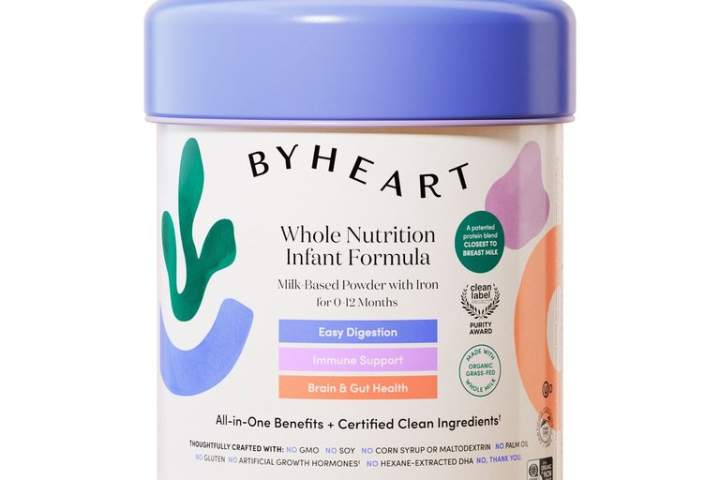Health
ByHeart Recalls All Baby Formula Amid Growing Botulism Cases

An outbreak of infant botulism in the United States has prompted ByHeart, a manufacturer of organic baby formula, to recall all of its products. This decision follows the hospitalization of at least 15 infants across 12 states who consumed the formula since August 9, 2023. Health officials have not reported any fatalities linked to the outbreak.
Initially, ByHeart recalled two specific lots of its formula on November 10, 2023, but subsequently expanded the recall to include all products sold nationwide. This comprehensive action affects ByHeart Whole Nutrition Infant Formula and Anywhere Pack pouches of powdered formula. The company sells approximately 200,000 cans of infant formula each month through various retailers, including Target, Walmart, Albertsons, and Whole Foods.
Dr. Devon Kuehn, ByHeart’s chief medical officer, advised parents and caregivers to “immediately discontinue use and dispose of the product” to prevent further illness. Despite the recall, officials noted that no unopened products tested positive for the botulism-causing bacteria.
Investigation and Health Risks
The bacteria responsible for the toxin is prevalent in the environment, and could originate from sources beyond the formula itself. ByHeart emphasized its commitment to safety, stating, “This action underscores ByHeart’s core mission: protecting babies above all else.” The company is collaborating closely with the U.S. Food and Drug Administration (FDA) during this recall process.
California health officials confirmed that a sample from an open can of ByHeart formula fed to a sick infant contained the hazardous bacteria. In response, the FDA has been investigating 84 cases of infant botulism reported since August, with 15 of those cases involving ByHeart products. The agency highlighted that ByHeart formula is “disproportionately represented among sick infants” considering it accounts for an estimated 1% of all infant formula sales in the United States.
The illnesses have been reported in several states, including Arizona, California, Illinois, Kentucky, Minnesota, North Carolina, New Jersey, Oregon, Pennsylvania, Rhode Island, Texas, and Washington. Health officials are still working to identify any additional sources of exposure, but no other infant formula brands have been implicated.
Understanding Infant Botulism
Infant botulism, though rare, poses severe health risks for babies under one year of age due to their immature gut microbiomes. The condition arises when infants ingest bacteria that produce spores, leading to toxin production in their intestines. Symptoms can include constipation, poor feeding, drooping eyelids, muscle weakness, difficulty swallowing, and respiratory issues. Immediate medical attention is critical for affected infants.
The only treatment available for this infection is BabyBIG, an intravenous medication derived from the blood plasma of individuals immunized against botulism.
The implications of the recall extend beyond the United States, raising questions about its impact on Canadian consumers. As of now, it is unclear whether the recall affects ByHeart products sold in Canada or if there have been any reported cases linked to the formula there. Global News has reached out to Health Canada for clarification and is awaiting a response.
In addition to the recall, ByHeart has committed to testing each batch of its formula with an independent third-party laboratory. The company is also granting health officials full access to its facilities and sharing results with regulators as they become available.
This situation underscores the importance of vigilance in infant nutrition and the swift action necessary to address potential health hazards.
-

 Education4 months ago
Education4 months agoBrandon University’s Failed $5 Million Project Sparks Oversight Review
-

 Science5 months ago
Science5 months agoMicrosoft Confirms U.S. Law Overrules Canadian Data Sovereignty
-

 Lifestyle4 months ago
Lifestyle4 months agoWinnipeg Celebrates Culinary Creativity During Le Burger Week 2025
-

 Health5 months ago
Health5 months agoMontreal’s Groupe Marcelle Leads Canadian Cosmetic Industry Growth
-

 Science5 months ago
Science5 months agoTech Innovator Amandipp Singh Transforms Hiring for Disabled
-

 Technology5 months ago
Technology5 months agoDragon Ball: Sparking! Zero Launching on Switch and Switch 2 This November
-

 Education5 months ago
Education5 months agoNew SĆIȺNEW̱ SṮEȽIṮḴEȽ Elementary Opens in Langford for 2025/2026 Year
-

 Education5 months ago
Education5 months agoRed River College Launches New Programs to Address Industry Needs
-

 Business4 months ago
Business4 months agoRocket Lab Reports Strong Q2 2025 Revenue Growth and Future Plans
-

 Technology5 months ago
Technology5 months agoGoogle Pixel 10 Pro Fold Specs Unveiled Ahead of Launch
-

 Top Stories4 weeks ago
Top Stories4 weeks agoCanadiens Eye Elias Pettersson: What It Would Cost to Acquire Him
-

 Technology3 months ago
Technology3 months agoDiscord Faces Serious Security Breach Affecting Millions
-

 Education5 months ago
Education5 months agoAlberta Teachers’ Strike: Potential Impacts on Students and Families
-

 Business1 month ago
Business1 month agoEngineAI Unveils T800 Humanoid Robot, Setting New Industry Standards
-

 Business5 months ago
Business5 months agoBNA Brewing to Open New Bowling Alley in Downtown Penticton
-

 Science5 months ago
Science5 months agoChina’s Wukong Spacesuit Sets New Standard for AI in Space
-

 Lifestyle3 months ago
Lifestyle3 months agoCanadian Author Secures Funding to Write Book Without Financial Strain
-

 Business5 months ago
Business5 months agoNew Estimates Reveal ChatGPT-5 Energy Use Could Soar
-

 Business5 months ago
Business5 months agoDawson City Residents Rally Around Buy Canadian Movement
-

 Business3 months ago
Business3 months agoHydro-Québec Espionage Trial Exposes Internal Oversight Failures
-

 Technology5 months ago
Technology5 months agoFuture Entertainment Launches DDoD with Gameplay Trailer Showcase
-

 Top Stories4 months ago
Top Stories4 months agoBlue Jays Shift José Berríos to Bullpen Ahead of Playoffs
-

 Technology5 months ago
Technology5 months agoWorld of Warcraft Players Buzz Over 19-Quest Bee Challenge
-

 Top Stories3 months ago
Top Stories3 months agoPatrik Laine Struggles to Make Impact for Canadiens Early Season










